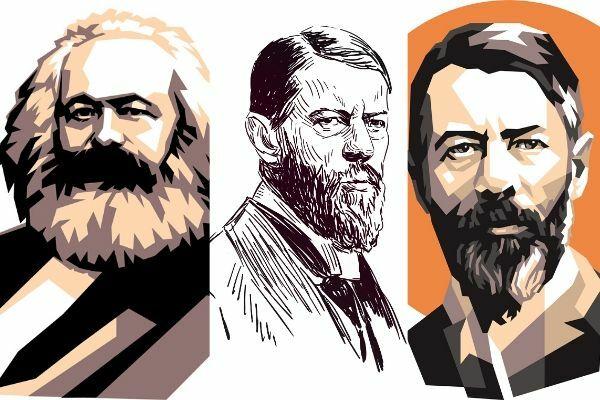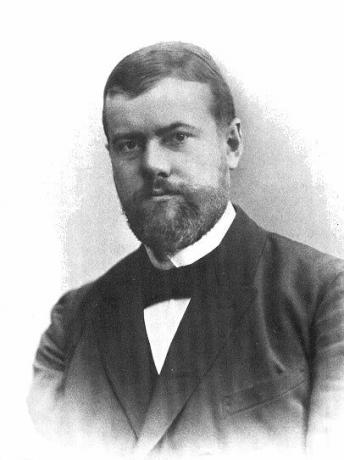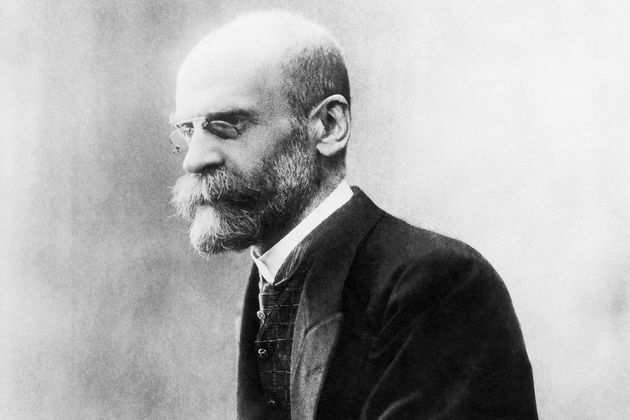You classic thinkers of sociology are the German philosopher and economist Karl Marx, the french sociologist Emile Durkheim and the sociologist, German political theorist Max Weber. Despite this, we cannot fail to mention the honorable participation of the French philosopher Auguste Comte, considered the “father” of sociology, for enunciating, for the first time, the need for a science capable of understanding the bases of society and creating intervention proposals so that it can fully develop.
With different views on the sociological method and the course of society, the authors of the so-called tripod of sociology (Marx, Durkheim and Weber) contributed immensely to the fundamental development of this science.

Birth of sociology: historical context
historical background
Since the 14th century, Europe has seen an ever-increasing rise of a new social class: the bourgeoisie. THE Protestant Reformation, occurred in the fifteenth century, and a new worldview, less dominated by medieval Catholic logic, allowed the even greater growth of this
new social class. The 16th and 17th centuries witnessed several social changes, such as scientific revolutions and the English Revolution.In the 18th century, the Independence of the Thirteen Colonies, which resulted in the establishment of the former English territory as the United States of America, a country republican democracy, and the French Revolution gave practical signs of the failure of the Old Regime (the absolutism). O enlightenment French — philosophical and political movement represented by Montesquieu and Voltaire, for example — also gave signs that the European people no longer accepted absolutism as a legitimate political regime.
Do not stop now... There's more after the advertising ;)
At the turn of the 18th to the 19th century, Europe was faced with a political and social crisis: France was under instability and political chaos left by the revolution, in addition to Industrial Revolution it caused an intense change in the spatial configuration of Europe, especially England, which took the lead in industrialization. There was a intense and sudden rural exodus in now industrialized cities, which caused social chaos due to the wave of misery, the spread of diseases and the consequent growing violence in urban centers.
See too: Contemporary philosophy - area of knowledge heavily influenced by this context
Emergence of sociology
Given this situation, the french philosopher Auguste Comte he began to talk about the need to radically change the direction society was taking. For the philosopher, it was necessary restore order for France to resume its growth. This order could only be achieved by a rigid society organization (as rigid as military standards require) and by valuing the scientism.

Science, for Comte, is the main key to intellectual and moral gives society. To intervene effectively in this, it would be necessary to understand how it is structured, which would be possible through a science that would analyze it. First, the name of this science, in Comte's theory, would be social physics. It was necessary for her to take a methodological rigor for you as well as the natural sciences. Later, Comte named his science sociology. This entire theoretical set of the philosopher became a kind of political and social movement that became known as Ppositivism.
Successors of Auguste Comte
Although he stated for the first time the need to build a science that would study society, Comte did not develop a method for it to work, he also failed to climb the philosophical abstractions which he said he had to overcome in his works. Who identified this was the French sociologist Emile Durkheim, considered the first specialist in this area for being the first to develop a method and going into the field to understand social structures. Durkheim also introduced sociology into the academic curricula of higher education courses.
Before him, Marx already dawned with his dialectical historical materialist method of social analysis. Despite the validity of the method for understanding social and economic structures as a whole, it did not develop a field work that allowed a deep understanding of all aspects of society in a rigorous and complex way, which made Durkheim take the post of first sociologist.

Finally, in the formation of the triad of classical sociology, we have the German sociologist, jurist and politician Max Weber. Weber proposed a method and a sociological look quite different from that proposed by Durkheim and Marx. Its historical importance is given, precisely, by the innovative vision he brought to sociology.
To summarize the position of classical authors, we can say that Durkheim and Weber are conservatives, defenders of capitalism, while Marx favors a revolution to overthrow for good that system. To learn more about the emergence of this science, go to: Emergence of sociology.
How the classical authors of sociology define social divisions
Each classic author of sociology understood society based on a different and peculiar view. AugusteComte he saw it as a complexity that should be addressed by positivism, always bearing in mind progress and scientism. At Social classes resulting from capitalism would be less unequal with the progress and the general order of society.
For KarlMarx, society had inherited from capitalism the division into social classes, which resulted in a profound social inequality. For him there are two social classes: bourgeoisie and proletariat. The bourgeoisie would be the class that owns the means of production (factories), while the proletariat would only own its labor power, usurped by the bourgeoisie via salaried work.
For Emile Durkheim, society is a whole organized based on its functions. The method proposed by him, functionalism, aims to understand the functions of each individual in society in order to understand it as a whole.

Maxweber, in turn, aimed to understand society as a complex whole of several different social actions. Each individual would act in a different way, and to know how these actions are ordered, it would be necessary to establish a parameter. The parameters would be the ideal types.
See too: Marxism – sociological doctrine created by Marx and Engels
Leading classical sociologists and their theories
The following is a summary of the theories of the main classical theorists of sociology:
KarlMarx
Marx's dialectical historical materialism understands that the history of mankind is based on a dialectical relationship between social classes. In case of capitalism, the division is between the bourgeoisie and the proletariat. Material production, the result of work, is the main constitutive element of society.
For Marx, the relationship between the two classes is unfair, and it is necessary, in his view, that there be a proletarian class revolution to dominate the means of production through the establishment of a dictatorship of the proletariat. This socialist dictatorship would tend to eliminate the differentiation of social classes altogether, resulting in communism. To learn more about this theorist and his theory, visit: Karl Marx.
Emile Durkheim
Society is a complex whole ordered by facts and governed by functions that are the mottos to understand it. According to Durkheim, in addition to the understanding of the functions, there should be, on the part of the sociologist, a understanding the facts that govern different societies., as they are fixed. In his words, such facts are external to the individual, coercive and generalizing, which makes them the only option for concrete and scientific understanding of society. Learn more about this sociologist by reading the text: Emile Durkheim.
Max Weber
German sociologist Max Weber vehemently disagreed with Durkheim's sociological theory. For the former, there are no social facts, but social actions that are individual. The role of the sociologist is to understand the functioning of society by understanding of individual social actions via comprehensive method.

In order for there not to be a lack of scientific rigor in the analysis, it would be necessary to understand a kind of expected pattern of social behavior. These patterns Weber called ideal types, which are the pattern of social understanding. Deepen your knowledge a little more about this author and his concepts by accessing: Max Weber.
by Francisco Porfirio
Sociology Professor


